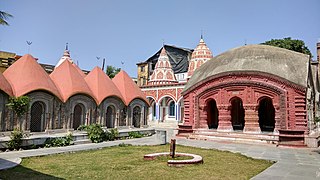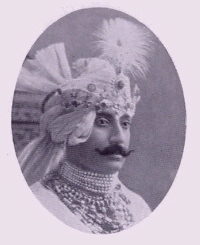
Murshidabad is a historical city in the Indian state of West Bengal. It is located on the eastern bank of the Bhagirathi River, a distributary of the Ganges. It forms part of the Murshidabad district.

The Nawab of Bengal was the hereditary ruler of Bengal Subah in Mughal India. In the early 18th-century, the Nawab of Bengal was the de facto independent ruler of the three regions of Bengal, Bihar and Orissa which constitute the modern-day sovereign country of Bangladesh and the Indian states of West Bengal, Bihar and Odisha. They are often referred to as the Nawab of Bengal, Bihar and Orissa. The Nawabs were based in Murshidabad which was centrally located within Bengal, Bihar, and Odisha. Their chief, a former prime minister, became the first Nawab. The Nawabs continued to issue coins in the name of the Mughal Emperor, but for all practical purposes, the Nawabs governed as independent monarchs. Bengal continued to contribute the largest share of funds to the imperial treasury in Delhi. The Nawabs, backed by bankers such as the Jagat Seth, became the financial backbone of the Mughal court. During the 18th century, the Nawabs of Bengal were among the wealthiest rulers in the world.

Berhampore is a city and a municipality in the state of West Bengal, India. As per the 2011 census, Berhampore has a population of 305,609 and is the seventh largest city in West Bengal. Berhampore is the administrative headquarters of the Murshidabad district. It is located about 200 km (124 mi) from Kolkata, the state capital. It is one of the most important business, administrative, educational and political hub of Bengal as well as of India. Congress Lok Sabha leader Shri Adhir Ranjan Chowdhury has been elected from this city since 1999. It is one of the most popular urban agglomerations of West Bengal state. It was the first centre of East India Company in India. Not only the British but also the Dutch and the French established their companies in this city and, as a result, it grew as a production hub of India. It is famous for its famous sweets such as Chanabora, Manohara, Rasgulla and many more. The city is divided into five administrative regions: Gora Bazar, Khagra, Indraprastha, Cossimbazar, Haridasmati. Berhampore was a part of Sepoy Mutiny of 1857 which took place at Berhampore Cantonment region. It was used by many foreign traders as their production hub. Before becoming a city many janpadas such as Saidabad; Farasdanga; Kalikapur had become famous. Cossimbazar had also become world famous for its muslin clothes. This city used to be the headquarters of Rajshahi administrative region till 1875.

Cossimbazar is a sub-urban area of Berhampore city in the Berhampore CD block in the Berhampore subdivision of Murshidabad district in the Indian state of West Bengal.

Kishan Shrikanth, professionally known as Kishan SS or Master Kishan, is a film actor and director from Bangalore, Karnataka. As of January 2006, having acted in 24 films and in many popular Indian soap opera, he directed a feature film, C/o Footpath, about an orphaned boy who wants to go to school. The film is adapted from a short story written by himself, and the cast includes prominent Indian actors Jackie Shroff, Saurabh Shukla, B. Jayashree, Sudeep and Tara. Kishan himself plays the lead. The film has been dubbed into five major Indian languages and it has also been released in English. It was first shot in Kannada and the original version was released on 26 November 2006.

Jangipur is a city and a municipality in Murshidabad district in the state of West Bengal, India. It is the headquarters of the Jangipur subdivision. It is situated on the banks of the Bhagirathi. Jangipur is an old town having reference from the historical period of Moghul emperor Jahangir when an army camp was established here.

Dhuliyan is a municipality town in the Samserganj block of Jangipur subdivision of Murshidabad district in the state of West Bengal, India. This municipality was established in the year 1909 and comprises 21 wards. It is located between the Ganges and the Feeder canal.
Harharia Chak is a census town in the Raninagar I CD block of the Domkal subdivision in the Murshidabad district in the Indian state of West Bengal.
Jagtaj is a census town in the Suti II CD block in the Jangipur subdivision of the Murshidabad district in the Indian state of West Bengal.
Jot Kamal is a census town in the Raghunathganj II CD block in the Jangipur subdivision of the Murshidabad district in the Indian state of West Bengal.
Srikantabati is a census town in the Raghunathganj I CD block in the Jangipur subdivision of the Murshidabad district in the Indian state of West Bengal.

Murshidabad district is a district in the Indian state of West Bengal. Situated on the left bank of the river Ganges, the district is very fertile. Covering an area of 5,341 km2 (2,062 sq mi) and having a population 7.103 million, it is a densely populated district and the ninth most populous in India. Berhampore city is the headquarters of the district.
Kandi is a sub-divisional city and a municipality in Murshidabad district in the Indian state of West Bengal. It is the headquarters of the Kandi subdivision and is located on the east bank of Kana Mayurakshi River. It is also known as the rice store of Murshidabad district, owing to its large production of rice. It is situated 30 km away from Berhampore, the district headquarter of Murshidabad and approximately 195 km from Kolkata, the capital of West Bengal.

The state of Karnataka in India has well known institutions like the Indian Institute of Science (IISc), Indian Institute of Technology, Dharwad (IIT,DWD) Indian Institute of Management (IIM), the National Institute of Technology Karnataka (NITK), Indian Institute of Information Technology, Dharwad (IIIT), International Institute of Information Technology, Bangalore, Visvesvaraya Technological University (VTU) and the National Law School of India University. In addition, a Visvesvaraya Institute of Advanced Technology (VIAT) is being constructed in Muddenahalli.
The Higher Secondary Certificate (HSC) or Higher Secondary School Certificate (HSSC) or Higher Secondary Education Certificate (HSE) is a secondary education qualification in Bangladesh, India and Pakistan. It is equivalent to the final year of high school in the United States and GCE A level in the United Kingdom.

Sir Sayyid Wasif Ali Mirza Khan Bahadur was the Nawab of Murshidabad during 1906–1959. Sir Wasif Ali Mirza was educated at Sherborne School, Rugby School and later at Trinity College. He succeeded his father Hassan Ali Mirza Khan Bahadur at his death on 25 December 1906. On 11 December 1931, Wasif Ali was forced to surrender the administration of his estates to the Government of India after incurring a debt of ₹19 lakhs. On 15 August 1947, the Radcliffe Award allotted the district of Murshidabad to Pakistan and the flag of Pakistan was hoisted at the Hazarduari Palace but within two days the two dominions exchanged Khulna, which is now in Bangladesh, and then the flag of India was hoisted at the grand palace on 17 August 1947. The Government of India also resumed him all his estates in 1953. Wasif Ali was also the founder and president of the Hindu–Muslim Unity Association in the year 1937, named Anjuman-e-Musalman-e-Bangla, which promoted Hindu–Muslim unity. The Nawab also built the Wasif Manzil.
Aurangabad is a census town in the Suti II CD block in the Jangipur subdivision of the Murshidabad district in the Indian state of West Bengal. The town lies between The Ganga and the feeder canal.
Farakka is a town, with a police station and a post office, not identified in 2011 census as a separate place, in the Farakka community development block in the Jangipur subdivision of Murshidabad district in the state of West Bengal, India. It is also known as the northernmost point of Ganga Delta.
Munshi Muhammad Ashraf Hussain, was a Bengali poet, researcher and a collector of puthis and folk literature. He was also known for his contribution in the study of the Sylheti Nagri script.

Murshidabad University is a public state university in Berhampore, Murshidabad, West Bengal. The university was established in 2021 by the West Bengal government under The Murshidabad University Act, 2018.











